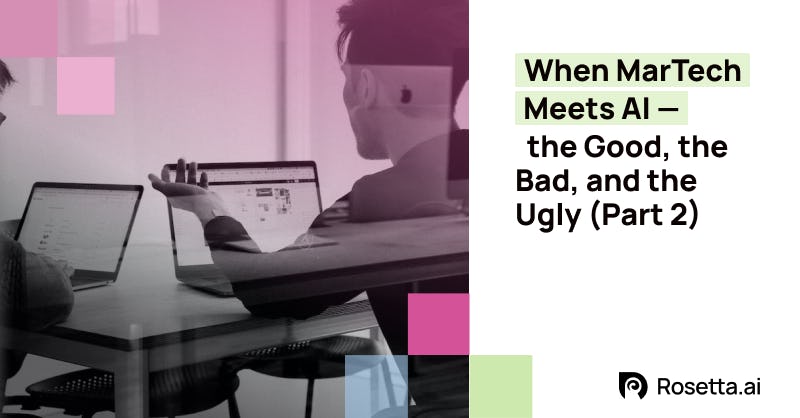In the last post, we discussed the applications of Artificial Intelligence (AI) on MarTech. By delivering contents more related to your users, you can increase your conversion rate and click-through-rates as well as your customer loyalty.
In addition, accurate sales forecasting will enable you to minimize your warehousing costs. The potential of AI applying to MarTech, undeniably, can bring tremendous profit to ecommerce. Yet, they are not without flaws. There are limitations and pitfalls that you should know about if you're shopping for an AI powered martech tool. In this blog post, we will focus on the bad. That is, some of the issues that complicate using AI for MarTech.
Limitations and pitfalls of AI for Martech
In our first post we outlined the good, so what's left is the bad and the ugly.
Messy product feed data
The power of AI is subject to the quality of the data it is trained on. That is to say, the richer and cleaner the data, the higher performance of the AI. Unfortunately, the majority of ecommerce brands, regardless of their scale, often poorly maintain their data in their product feed structures.
For instance, a fashion-related ecommerce client of Rosetta AI had a dataset, initially, with an attribute called “category”, which literally records which category the product belongs to. On a holiday, they planned to launch a campaign where some of the products will be on sale.
Instead of adding a campaign tag for each of these on-sale products, they duplicated the original ones, changing the price, and modifying their “category” attributes.
Although this may be an easy way for merchants to put products on sale, this makes their product feeds extremely messy and reduces the quality of the data. Aside from the fact that there exists duplicated items on their sites, this may befuddle the AI systems since they have no clue that some items are actually the same.
Data regulation
The General Data Protection Regulation (GDPR) has been in effect for many years now. It applies to all citizens of European Union (EU) and the European Economic Area (EEA), roughly covering all of Europe. It places tight constraints on the collection and usage of personal data.
Although it successfully protects their privacy to a certain degree, it also obfuscates data or renders it incomplete, thus making it less than ideal for personalized marketing. Recommender system (RS), for instance, can only work sub-optimally if contextual and user-related data are not available.
While we can still leverage session-based recommender system techniques to deal with this situation, RS would be undoubtedly more powerful with the support of user information. For most MarTech companies, in addition to efficiently utilizing the limited data they can collect, it is also challenging to carefully read the GDPR legal codes and make sure they do not violate them.
Fraudulence
Many MarTech companies claim that they are using AI. Unfortunately, some of them are frauds, faking AI with conventional programming, some are not even workable, and only a small portion of them are legit AI MarTech companies.
One example would be iFlytek, a speech recognition AI company from China. They once stated that their product can achieve highly accurate real-time machine translation for speech. In their demos, it seems that their product was truly amazing with fast and accurate translation.
However, the truth is that there were actual humans behind the screen typing and doing the translation themselves. This is completely absurd. While iFlytek is not a MarTech company, the reason behind this incident applies to all the AI companies. Aside from the fundamental integrity issue of the fake AI companies, another main factor causing this incident is that people are too overwhelmed by AI and that they believe that AI has unlimited superpower.
This belief can be positive as more companies may be willing to adopt AI, but also believe it can be very dangerous. Too much expectation on AI can result from unreasonable demands on the AI products from the client companies or customers. Therefore, in order to meet those requirements, some AI companies decide to cheat rather than discussing the technology infeasibility with their clients.
What can you do to avoid the pitfalls?
To avoid adoptions of inferior MarTech, it is essential to keep in mind three things:
Know the law
As I mentioned, due to GDPR and other privacy-related laws, data collection and transfer are now a serious issue that everyone should pay attention to. A company could easily be fined a huge amount of money for violating any of these laws.
For example, violators of GDPR alone can be fined up to €20 million, which could result in bankruptcy for most companies. Before adopting a new AI product for MarTech, make sure you understand what data they are collecting, know if the personal data be deleted by their owner, and know how they are using these data. Otherwise, your company will be at great risk.
Keep realistic expectations about AI
AI is great, but it does not have the superpowers you might think. We should definitely be positive about AI MarTech because this industry is booming. Yet, we should keep reasonable expectations so that we can maintain a healthy AI ecosystem. In fact, one of the major reasons of the last AI winter was that AI failed to meet the unreasonably high expectations projected by humans.
Always validate new technology
Before adopting a new technology, make sure you can try it before actually using it. Although there is no guarantee that the product will still work after the trial periods, it is better than never seeing it work ever.
At Rosetta AI, our recommender system service provides a 30-day free trial. During that time, we help you conduct A/B testing between your original recommender system and ours. You can easily compare our products with other competitors’.
In addition to profitability, make sure your company also evaluates a new technology in terms of feasibility and applicability. If any of these three components are not met, perhaps it is not a good idea to adopt this technology.
All in all, AI-powered MarTech has great potential for generating revenue. But not all systems are equal and some are fake. Choose wisely friends!







.jfif?ixlib=gatsbyFP&auto=compress%2Cformat&fit=max&q=50&w=800&h=529)
